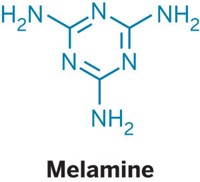Advertisement
Grab your lab coat. Let's get started
Welcome!
Welcome!
Create an account below to get 6 C&EN articles per month, receive newsletters and more - all free.
It seems this is your first time logging in online. Please enter the following information to continue.
As an ACS member you automatically get access to this site. All we need is few more details to create your reading experience.
Not you? Sign in with a different account.
Not you? Sign in with a different account.
ERROR 1
ERROR 1
ERROR 2
ERROR 2
ERROR 2
ERROR 2
ERROR 2
Password and Confirm password must match.
If you have an ACS member number, please enter it here so we can link this account to your membership. (optional)
ERROR 2
ACS values your privacy. By submitting your information, you are gaining access to C&EN and subscribing to our weekly newsletter. We use the information you provide to make your reading experience better, and we will never sell your data to third party members.
Safety
Drug Tainted Food Is A Concern For Athletes
by Marc S. Reisch
August 11, 2008
| A version of this story appeared in
Volume 86, Issue 32
Many athletes preparing for the Olympic Games considered more than their physical training; they also planned what food to bring to China. Antibiotics, growth stimulants, and steroids are often used by Chinese breeders to boost meat production. Some athletes fear those banned substances could show up in the local food they eat and then in their drug tests, disqualifying them from the Olympic competition.
Athletes' concerns are justified, notes Caroline K. Hatton, former associate director of the Olympic Analytical Laboratory at the University of California, Los Angeles, which tests athletes for banned drugs. A number of published studies have shown that consumers who took blood tests soon after eating meat containing anabolic steroids tested positive for the hormones, says Hatton, who is now a consultant to antidoping organizations.
Chinese officials insist that the local food supply is drug-free, but at least one Chinese athlete's experience suggests otherwise. In late June, China banned top swimmer Ouyang Kunpeng for life after testing positive for steroids.
The star backstroker said that while on vacation he may have eaten meat injected with clenbuterol, a banned body-building drug. Although the steroid is barred for use by Chinese farmers, more than 300 people became ill in 2006 after eating clenbuterol-tainted pork in Shanghai.
To avoid a repetition of Ouyang's experience, the U.S. Olympic Committee has made arrangements to feed athletes at its training center at Beijing Normal University, about 20 minutes outside the Olympic Village. The athletes will be eating beef, chicken, and pork shipped from U.S. suppliers. Others have made their own special food arrangements, too, such as the Canadian, British, and Australian teams.
Leading up to the Olympics, Chinese officials said they had set up extensive farm-to-table monitoring systems for food intended for Olympic athletes. In addition, Wu Zhen, vice commissioner of the State Food & Drug Administration, says his agency has cracked down on illegal production and distribution of anabolic agents. And during the past year, he says, the agency has also penalized 321 websites that illegally offered anabolic steroids for sale.
But despite assurances from their Chinese hosts, at least some athletes won't take any chances. They'll wait until after the competition is over to sample the local cuisine.
- » Drugs At The Starting Line
- The Olympics begin with new antidoping lab and measures to keep athletes honest
- » Groups Push Long-Term Efforts To Stop Drug Abuse
- Several groups are trying their hand at setting up long-term monitoring programs to be sure athletes remain drug free
- » Drug Tainted Food Is A Concern For Athletes
- Many athletes preparing for the Olympic Games considered more than their physical training




Join the conversation
Contact the reporter
Submit a Letter to the Editor for publication
Engage with us on Twitter